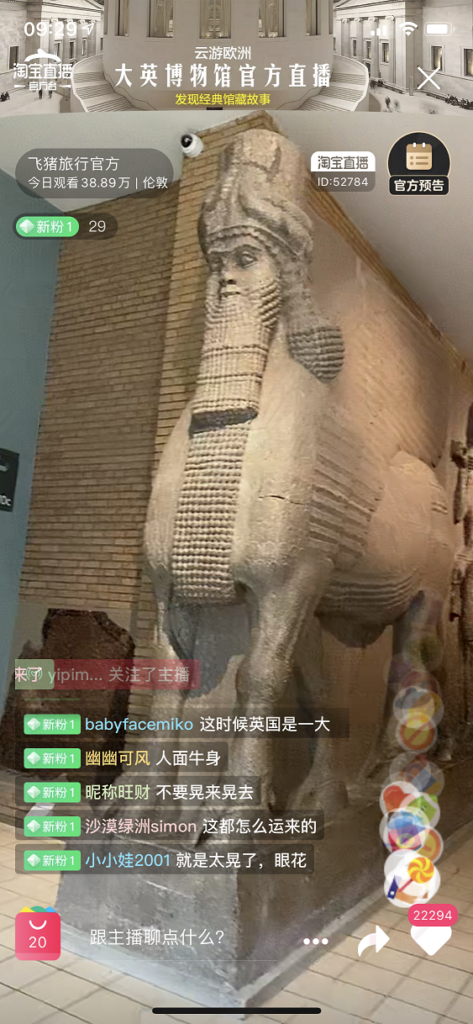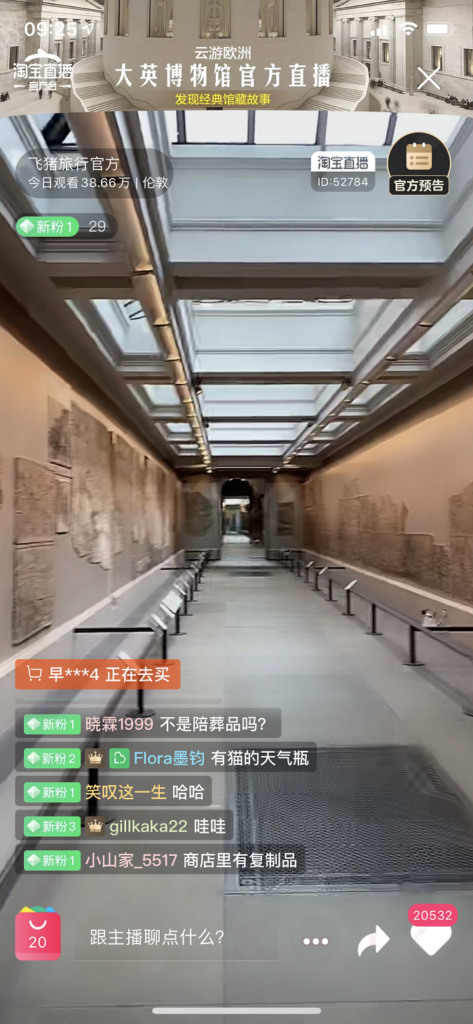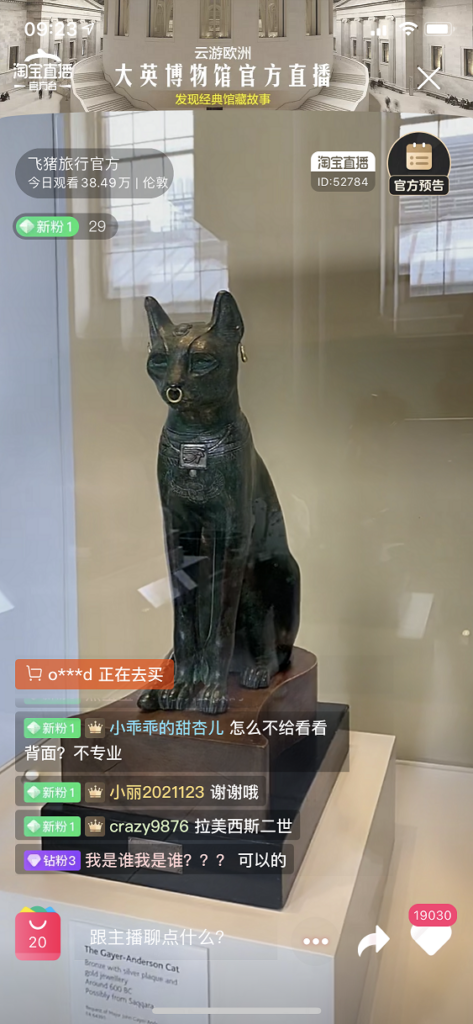Chinese online travel agency Fliggy has partnered with the British Museum in London to livestream exhibition tours in a bid to boost traveller confidence. Sam Ballard reports
The British Museum has partnered with Fliggy, Alibaba’s online travel platform, to give behind-the-scenes, livestream tours in a bid to encourage Chinese travellers to return to the UK once travel restrictions lift.
The stream lasted for two hours with 370,000 people watching during the first minute.
Viewers were guided around the museum by Chinese-speaking guide Yiman Lin, who explained the history of some of the British Museum’s most famous artefacts, including the Rosetta Stone, the statue of King Ramesses II, the Parthenon sculptures and the double headed Aztec serpent. Roderick Buchanan, the British Museum’s commercial director, said: “It has been amazing to be able to livestream this tour of some of the museum’s most-loved objects. A visit to the British Museum is a ‘tour around the world’.
Roderick Buchanan, the British Museum’s commercial director, said: “It has been amazing to be able to livestream this tour of some of the museum’s most-loved objects. A visit to the British Museum is a ‘tour around the world’.
“With international travel restrictions still in place, we wanted to find a new way to give prospective visitors a chance to experience the museum and by partnering with Fliggy, we’ve been able to do just that.
“Using livestreaming technology, we can offer thousands of people in China VIP access to our exhibitions showcasing the richness and diversity of the museum’s extraordinary collection, as well as share travel top tips.
“We can’t wait to reopen and look forward to welcoming people from across the globe, when it is safe to do so.” Currently, Fliggy brings together more than 400 airlines and air travel agents, more than 8,000 scenic spots, more than 600,000 hotels and inns as well as hundreds of thousands of local entertainment activities.
Currently, Fliggy brings together more than 400 airlines and air travel agents, more than 8,000 scenic spots, more than 600,000 hotels and inns as well as hundreds of thousands of local entertainment activities.
Leveraging Alibaba’s ecosystem, Fliggy also provides merchants in the travel industry with a rich digital platform to help them engage with Chinese travellers. With diverse travel service offerings and digital innovations, Fliggy acts as a one-stop shop for Chinese travelers seeking the ultimate travel experience.
Chinese e-commerce site Alibaba has also held livestream events of other European attractions, including the Palace of Versailles, Serbia’s capital Belgrade and the Nuuksio National Park in Finland.

David Lloyd, General Manager, UK, Netherlands and Nordics for Alibaba Group, said: “Travellers from China are crucial to the UK’s tourism industry and prior to the pandemic demand remained high, with 2020 flight bookings from China to the UK up 33 per cent year-on-year.
“Livestreaming offers an entirely new perspective for Chinese travellers who are keen to explore the UK once travel restrictions ease. Instead of simply recording a video livestreaming gives customers an opportunity to take a closer look and to learn more about the museum.” Livestreaming has become central to marketing campaigns in China. Fliggy alone has hosted 30,000 livestreaming tours since February of this year, attracting more than 270 million views.
Livestreaming has become central to marketing campaigns in China. Fliggy alone has hosted 30,000 livestreaming tours since February of this year, attracting more than 270 million views.
Lloyd added: “Visit Britain estimates that one job in the UK’s tourism industry is created for every 22 inbound Chinese tourists, and we hope today’s livestream will provide the travel industry with a much-needed boost when travel restrictions lift.”
Chinese spending power
The British Museum first entered a partnership with Alibaba’s online licensing platform, Alifish, in 2016 to help it develop a product portfolio that’s tailored to the China market.
Two years later, it launched a flagship store on Tmall, making it the first international museum to do so. Its first batch of products sold out within 16 days, becoming so popular that it had to replenish stock shortages more than 30 times in two months. Today, the store has close to 1.45 million followers.
Last year, Fliggy launched an e-commerce portal to make the shopping experiences of Chinese tourists easier. According to KR Asia: “The shopping tab exists on the opening screen of the Fliggy app, just below the customary booking services for transportation, lodging, and tourist sites.
“Users can browse and select products, then set a preferred time and location to pick up the goods. They have the option of paying upfront to guarantee their purchase and avoid queues. The feature could improve the shopping experience for Chinese traveling by sidestepping language barriers.”
According to an interview on Jing Travel with Eduardo Santander, executive director of the European Travel Commission, the number of Chinese tourists expected to go to Europe will be deeply impacted by the Covid-19 pandemic.
He says: “As we move towards 2024, the number of Chinese tourist arrivals to Europe is expected to grow annually by 2.6 per cent. This is a significant slowdown compared to the annual growth rates that we expected before the Covid-19 pandemic, which stood at 7.1 per cent.
“In terms of the category of tourists we are likely to see arriving in Europe, we expect an increase of Free Independent Travellers (FITs), more independent and self-guided trips, and a shift towards smaller groups rather than large group tours.”
What’s coming next? Trend reports available to download HERE



